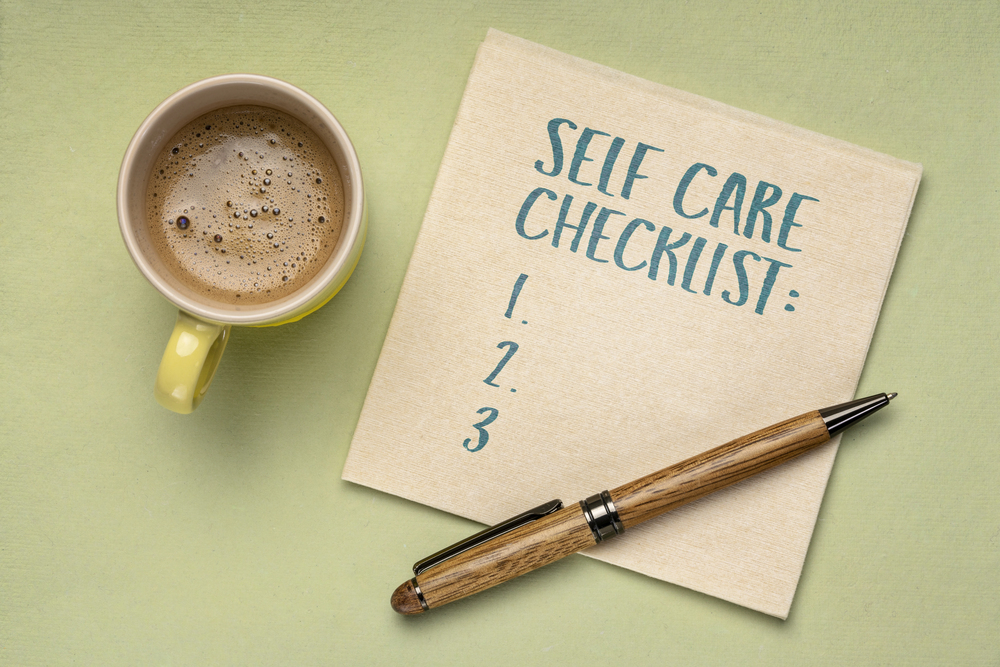
by Shelley | Nov 4, 2025 | Caregiving
As a caregiver, you spend countless hours ensuring the comfort, safety, and well-being of someone else. That often comes at the expense of your own needs. While caregiving is an act of love and dedication, it can also be physically exhausting, emotionally draining, and mentally overwhelming.
That’s why the start of a new year is the perfect time for caregivers to commit to self-care resolutions that prioritize health, happiness, and balance. Here are some goals every caregiver should consider setting in the new year to build resilience and restore personal well-being.
Self-Care Resolution Tips for Family Caregivers
Caregivers often put their own health on the back burner to tend to their loved one’s needs. But maintaining your physical well-being is essential to your ability to continue caring for your family member. Remember, you can’t perform your caregiving duties if you experience a health crisis of your own.
Make a resolution to:
- Schedule your regular health check-ups
- Get at least 30 minutes of physical activity most days of the week
- Stay hydrated and eat balanced, nourishing meals
- Get 7–8 hours of quality sleep each night
Even small steps, like going for a daily walk or drinking more water, can improve your energy levels and mood.
Set Healthy Boundaries When Caregiving
Saying “yes” to every need and request your loved one makes may feel like part of the caregiver role, but it’s also a fast track to burnout. In the new year, commit to setting realistic limits.
That might mean:
- Delegating tasks to other family members or hiring a professional
- Saying “no” when something stretches you too thin and wears you out
- Creating a schedule that includes personal time for yourself
Having caregiving boundaries is not selfish. It is a necessity for protecting your mental and emotional well-being.
Make Time for Yourself—Every Day
Beyond setting healthy boundaries is the need to block out time to take care of yourself. Self-care isn’t just about occasional spa days or vacations. It’s about daily habits that refuel you.
Make a resolution to set aside time every day for something that brings you joy or peace. It could be:
- Reading for 15 minutes
- Meditating or practicing deep breathing
- Journaling or engaging in other creative hobbies
- Listening to music or a favorite podcast
Even a few minutes of “you” time can make a big difference in your own sense of well-being.
Stay Connected with Others
Caregiving can be isolating, especially if you’re the primary or sole caregiver. This year, resolve to stay connected:
- Reach out to friends and family regularly, even with a text, short phone call or video chat.
- Join a caregiver support group. You’ll find many options, both in person and online.
- Seek emotional support from a therapist or counselor when needed.
You don’t have to carry the emotional weight alone. Talking to others who understand your situation can be incredibly validating and healing.
Ask for and Accept Help
One of the most powerful resolutions you can make as a caregiver is giving yourself permission to ask for and accept help. Whether it’s asking a friend or neighbor to pick up groceries or hiring an in-home caregiving aide, letting others assist doesn’t mean you’re failing. In fact, it actually protects your ability to continue caregiving in a healthy way.
Respite Care at Heritage Communities
When you don’t have friends or family members who can pitch in and give you a break, respite services at a senior living community can be a solution. These short-term stays allow assisted living providers, such as the teams at Heritage, to care for your loved one while you enjoy some time on your own.
Call a Heritage location near you to learn more!

by Shelley | Nov 4, 2025 | Caregiving
Dear Donna:
For the holidays, my family and I will be heading back to my hometown. I would like to visit an aunt I was always close to who resides in an assisted living community. She never had any children of her own, so my siblings and I make a point of staying in touch with her.
It’s been several years since I’ve seen her in person, and I would like to catch up with her and have my kids get to know her. While I’m excited to reconnect with my aunt, I’m also a little apprehensive. I’ve never been to an assisted living community before.
Is it okay to visit during the holidays? Are there certain hours we should go? Any tips would be much appreciated.
Carole in Holland, MI
Tips for Visiting a Senior in Assisted Living During the Holidays
Dear Carole:
As you know, the holidays are a season when families come together, share memories, and celebrate traditions. For seniors residing in assisted living communities, this time of year can be both joyful and difficult.
Residents like your aunt might enjoy participating in the many social activities that take place in communities this time of year. The environment is usually festive and bright. But feelings of loss, such as of a spouse, health, or a home, can also be more persistent during the holidays.
Your visit can make a meaningful difference, bringing comfort, warmth, and a sense of family to your aunt. Here are some tips to help a first-time visitor make the most of their time with a loved one:
- Call ahead and plan around the community schedule.
Assisted living communities often host holiday events, meals, and outings for residents. Before visiting, call the community to find out if there are any scheduled activities. This helps you plan your visit for a time that doesn’t conflict with other festive happenings. Depending on what activity is on the schedule, your family might even be able to join in.
- Bring holiday cheer (in moderation).
Check in with the staff before you visit to see if your aunt’s apartment or suite is already decorated for the holidays. If not, a few thoughtful decorations can brighten her space. A small tabletop tree, a wreath for the door, or battery-operated string lights can bring the holiday spirit without overwhelming the room.
Just remember to keep decorations simple, safe, and easy to store for next year. Also, since you live out of town, talk with other family members to see if someone can help remove the decorations when the season ends.
Small, meaningful gifts can bring joy to a resident of an assisted living community. Consider items like cozy, non-skid socks, puzzles, a framed family photo, large-print books, or a favorite holiday snack. Personalized gifts or homemade items often mean the most.
Avoid clutter or anything that might be difficult for them to use or manage. Also, be mindful of the fact that many assisted living apartments have a limited amount of storage space. So, gift cards, “experience” gifts, and smaller items are usually best.
- Take a walk or visit common areas.
Finally, if your aunt is mobile and the weather allows, ask her to show you around the community. You can go for a stroll around the grounds and meet some of the residents and staff. It’s also a good opportunity to show your loved one you care about their daily life.
Meeting the team also makes it easier for you to check in with them if you are concerned about your aunt’s well-being. They’ll know who you are and you’ll be able to put a face to a name when you call.
I hope this helps make your first visit go more smoothly!
Kind regards,
Donna

by Shelley | Nov 4, 2025 | Healthy Aging
Getting a good night’s sleep is essential at any age. However, getting a full night of deep, restorative rest often becomes more challenging as we grow older. Many older adults report difficulty falling asleep, staying asleep, or waking up too early. According to the National Council on Aging, as many as 70 million adults live with persistent sleep problems.
While some changes in sleep patterns are natural with aging, poor sleep is not something you just have to accept. There are effective strategies to improve sleep quality and feel more refreshed each morning.
Understanding Age-Related Sleep Changes
As we age, our body’s internal clock, known as the circadian rhythm, shifts. That can lead to earlier bedtimes and wake-up times. Sleep may also become lighter, making older adults more sensitive to disturbances such as noise or light. Medical conditions, medications, and stress can further disrupt sleep.
However, it’s a myth that older adults need significantly less sleep. Most seniors still require about 7 to 8 hours of sleep per night. The key is improving the quality of that sleep.
Here are a few suggestions for you to explore if you are a senior struggling with sleep problems:
- Maintain a consistent sleep schedule.
Going to bed and waking up at the same time every day—even on weekends—reinforces your body’s natural sleep-wake cycle. Consistency helps train your brain to recognize when it’s time to wind down and when it’s time to wake up.
If you need to adjust your sleep schedule, do so gradually. Try to change your sleep time by no more than 15–30 minutes at a time until you reach your desired routine.
- Create a sleep-friendly environment.
Your bedroom should be cool, quiet, and dark. Use blackout curtains, white noise machines, or earplugs if necessary. Make sure your mattress and pillows provide proper support for your body. A clutter-free, calming bedroom helps signal to your brain that it’s time to rest.
Also, keep screens (TV, phone, tablet) out of the bedroom or at least turn them off an hour before bedtime to reduce exposure to blue light, which can suppress melatonin production.
- Stay physically active during the day.
This one might seem like a tall order when you are sleep deprived and feeling tired. But regular physical activity, such as walking, swimming, or yoga, can help you fall asleep faster and enjoy deeper sleep.
Sleep experts encourage people to aim for at least 30 minutes of moderate exercise most days of the week. However, avoid vigorous workouts within 2–3 hours of bedtime. They may be too stimulating and make it even harder to fall asleep.
- Watch your diet and caffeine intake.
What you eat and drink impacts your sleep. Avoid large meals, spicy foods, and caffeine late in the day. Caffeine can stay in your system for up to 8 hours, so switch to decaf or herbal tea in the afternoon.
While some people think alcohol helps them sleep better at night, experts say that’s just not true. Alcohol may make you feel sleepy at first, but it can interfere with sleep quality later in the night.
While short naps (20–30 minutes) can be refreshing, late-day or long naps may make it harder to fall asleep at night. It can be a difficult cycle to break, especially when you are feeling worn out from a lack of sleep. If you need to nap, try to do so before 3 p.m.
- Manage stress and mental health.
Anxiety, depression, and loneliness can negatively impact sleep. That’s where mindfulness practices such as meditation, deep breathing, or gentle stretching before bed can help relax your mind. Talking to a counselor or joining a support group of peers who share similar struggles may also be beneficial if stress or difficult emotions are affecting your rest.
- Consider starting a sleep diary.
Keeping a sleep journal can help you identify patterns or habits that might be affecting your sleep. Record your bedtime, wake time, naps, what you ate, physical activity, and how you felt the next day. Share this information with your health care provider if you’re having ongoing issues.
If despite your best efforts, you still can’t get a good night’s rest, schedule an appointment with your doctor. Many common medications, including those for high blood pressure, allergies, and depression, can interfere with sleep. Another health condition, such as restless leg syndrome or sleep apnea, could be keeping you up. Your doctor might even want to refer you to a sleep specialist for further testing.
Follow the Heritage Blog for More Updates
If you are an older adult or the family caregiver for one, we encourage you to bookmark our blog and visit often. Each week, we share new articles on topics ranging from beating the winter blues to using technology to virtually visit faraway family members.

by Shelley | Nov 4, 2025 | Dear Donna
Dear Donna:
My dad came to stay with my husband and our family this spring. He had been living alone since my mom passed away two years ago. We felt like he was spending too much time alone and not socializing much. It was negatively impacting his mental and physical well-being.
Mom and Dad used to host Christmas every year. My brother and his family would fly in for a few days and stay with my parents. Since we sold the house before moving Dad in with us, however, this year will be different. My brother has decided they won’t be coming for a visit until after the new year.
I’m hoping to find ways for my dad and my brother’s children to visit virtually throughout the holiday season. Like my kids, they are teenagers. So, I’m finding it difficult to come up with good ideas. Do you have any suggestions?
Sincerely,
Caitlyn in Traverse City, MI
Virtual Ways Grandparents and Teens Can Connect This Christmas
Dear Caitlyn:
What a good observation on the part of you and your husband. Loneliness and isolation among older adults are linked to a variety of health issues ranging from depression to diabetes. It is very thoughtful to move your dad in with you, even temporarily.
The holiday season is a time for family, love, and connection. When distance or circumstances prevent grandparents and teenagers from gathering in person, technology offers creative ways to stay close and make meaningful memories together. Here are some fun and heartwarming ways to bridge the generational gap virtually this Christmas.
- Virtual holiday movie nights
Pick a classic Christmas movie, such as Home Alone, Elf, or The Santa Clause, and watch it together using a platform like Teleparty or Zoom. Don’t forget to encourage movie snacks for all parties involved!
- Holiday recipes and virtual cooking sessions
Food brings people together, even over video chat. Grandparents can walk teens through a cherished family recipe while cooking “together” on a Zoom call. This shared experience not only teaches cooking skills, but also keeps family traditions alive.
Games like Scrabble GO, Words with Friends, or online card games can be another fun way to connect. For something more personal, try trivia games based on family history. Have the teens prepare questions about the family tree, and grandparents can share stories sparked by the answers.
- Digital holiday scrapbooking
Use platforms like Canva or Google Slides to create a shared digital scrapbook. Grandparents can upload old Christmas photos, and teens can add modern touches, captions, or music. It’s a collaborative way to share memories and learn about each other’s experiences.
- Christmas karaoke or caroling via video chat
Nothing says holiday spirit like singing together. Host a virtual karaoke or caroling session. Teens can create a playlist, and everyone can join in from their living rooms. Don’t forget to video record it so you can have it for many years to come.
Connecting across generations doesn’t require being in the same room—it just takes intention, creativity, and a little digital magic. This Christmas, let the spirit of togetherness shine, no matter the distance.
Kind regards,
Donna
Tour Independent Living at Heritage Senior Communities
Retirement is a season in life most of us look forward to for many years. But the reality of maintaining a home can limit how you spend your time and money. If you are ready for a more hassle-free lifestyle, we encourage you to explore independent living communities that are a part of the Heritage family.
This popular type of senior housing offers older adults freedom, flexibility, and friendship. Call a community near you to schedule your private tour today!




